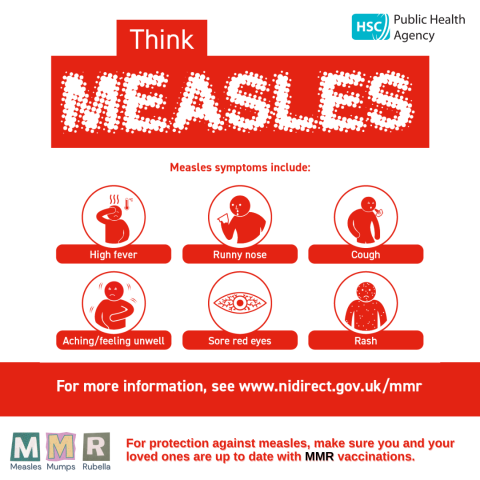Confirmed case of measles a timely reminder to get MMR vaccine

The Public Health Agency (PHA) is emphasising the importance of getting the MMR vaccine as it confirmed that one case of measles has been diagnosed in Northern Ireland.
Close contacts have been notified and all appropriate public health actions are being undertaken.
The PHA is urging children and young adults who have not received both doses of the measles, mumps and rubella (MMR) vaccine to do so as soon as possible, to reduce their risk of catching and spreading measles. The agency has recently activated a mass vaccination drive in collaboration with health trusts and GP surgeries for all those aged between 12 months and 25 years who missed getting one or both of their MMR vaccines first time round.
Dr Joanne McClean, Director of Public Health at the PHA, said: “Identification of a case of measles in Northern Ireland was not unexpected, as we have seen a significant rise in cases in England and across Europe. However, in order to help prevent any additional cases here and possible outbreaks, it is vital that those who have not had their two doses of the MMR vaccine to act now and reduce the risks from this highly contagious and potentially deadly disease.
“We have seen a decrease in the numbers of children receiving the MMR vaccines. It is therefore important that children and young adults get any missed MMR vaccines as soon as possible.
“If you are unsure if your child or you have received the two doses of the MMR vaccine, check the ‘red book’ or contact your GP practice to find out.”
The vaccination catch-up programme that is currently under way in Northern Ireland is offering first and second doses of the MMR to anyone aged between 12 months and 25 years who missed getting the vaccines first time around. Those who have never received any doses of MMR vaccine should book early to allow one month between dose one and dose two before the end of March.
Measles is highly infectious and is caused by a virus that can easily spread between unvaccinated people. It used to be very common in children, but following the introduction of the MMR vaccine, cases became very rare with no confirmed cases in the last seven years. Two doses of the MMR vaccine provides the best protection against these diseases.
As measles is very infectious it is important that anyone with suspected measles avoids any situation where they can spread the disease, such as a GP waiting room or an emergency department. People should phone in advance and get advice rather than turning up to a healthcare setting (except in an emergency).
The initial symptoms of measles can include:
- a high temperature (fever);
- a runny or blocked nose;
- sneezing;
- a cough;
- sore, red eyes that may be sensitive to light;
- a few days later, a red-brown blotchy rash will appear. This may start on the head or upper neck, before spreading outwards to the rest of the body.
Most childhood rashes are not measles but you should consult your GP without delay if:
- you suspect it is measles;
- symptoms worsen;
- temperature increases to above 38°C;
- temperature stays high after other symptoms have gone.
For information on the MMR vaccination catch-up programme, see www.nidirect.gov.uk/mmr-catch-up
For further information on measles see www.nidirect.gov.uk/conditions/measles
